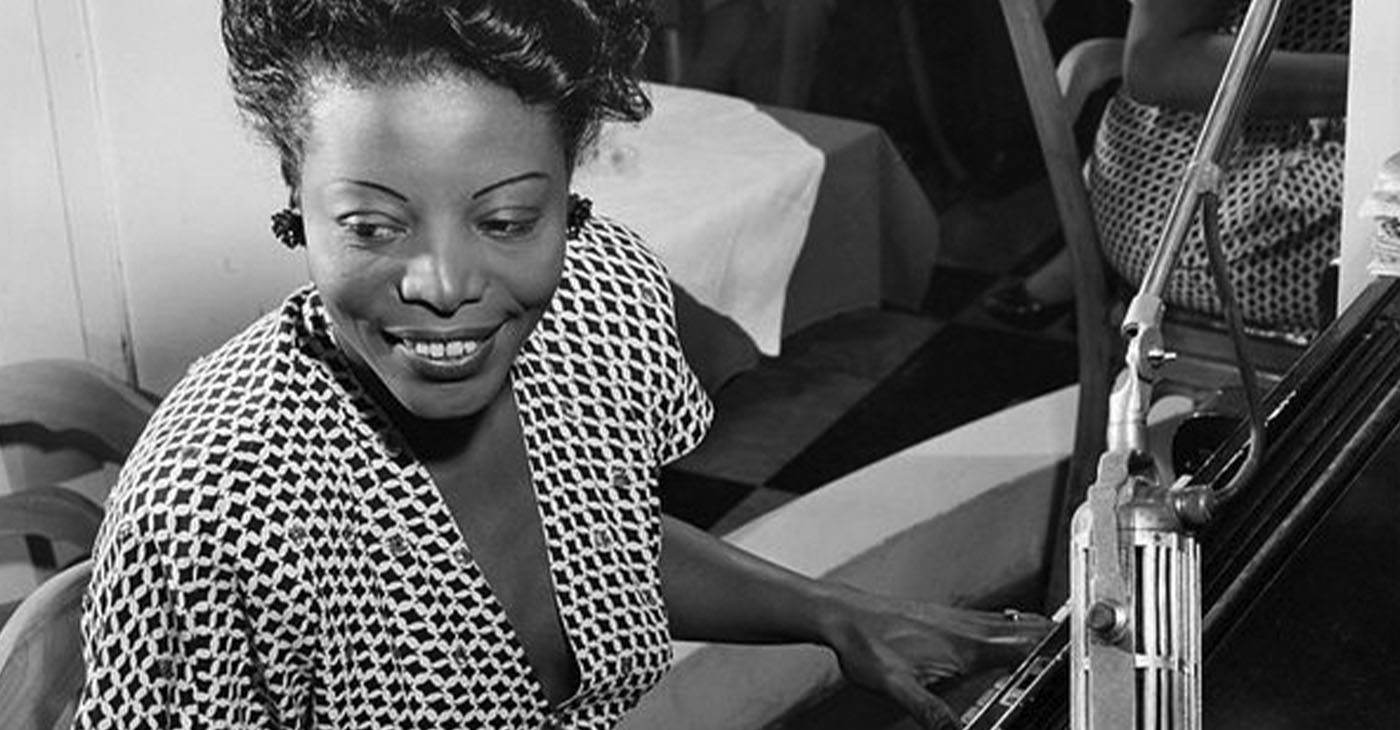Black History
Mary Lou Williams: Jazz Pioneer and Composer Extraordinaire
Mary Lou Williams was born on May 8, 1910, in Atlanta, and passed away on May 28, 1981, in Durham, N.C. Her influence extended far beyond the fame her extraordinary piano skills brought her. Williams’s innovative compositions, exceptional virtuosity, and unwavering dedication to her craft made her a trailblazer in a male-dominated genre.

By Tamara Shiloh
Mary Lou Williams was born on May 8, 1910, in Atlanta, and passed away on May 28, 1981, in Durham, N.C. Her influence extended far beyond the fame her extraordinary piano skills brought her. Williams’s innovative compositions, exceptional virtuosity, and unwavering dedication to her craft made her a trailblazer in a male-dominated genre.
Born Mary Elfrieda Scruggs, Williams displayed remarkable musical talent from a young age. Raised in Pittsburgh, she began playing the piano at three years old and was performing publicly by the age of six.
During her teenage years, Williams performed at local clubs and theaters in Pittsburgh, often sharing the stage with notable musicians of the era, including saxophonist Lester Young and trumpeter Tommy Thigpen.
In the 1920s, Williams’s jazz career took off as she joined saxophonist John Williams’ band. This marked the beginning of an illustrious journey, during which she gained recognition for her skillful piano playing and her talent for arranging music for big bands. Throughout the 1930s and 1940s, Williams collaborated with jazz legends such as Duke Ellington, Benny Goodman, and Andy Kirk.
As jazz evolved in the 1950s and 1960s, so did Williams. She embraced the bebop movement and explored new musical forms. Her composition “In the Land of Oo-Bla-Dee” is considered an early example of a bebop composition by a female jazz artist.
Williams also played a crucial role in mentoring young jazz musicians. Her Harlem apartment became a hub for emerging talents like Thelonious Monk, Bud Powell, and Charlie Parker. She provided guidance and encouragement, helping these musicians refine their skills and contribute to the development of modern jazz.
Rediscovered in the 1970s after a brief hiatus from the jazz scene, Williams continued to perform and record music. Her later works, including “Zodiac Suite” and “My Mama Pinned a Rose on Me,” showcased her evolving style and creativity.
Williams received numerous awards and honors, including the Kennedy Center Honors in 1980, becoming the second jazz musician to receive that prestigious accolade after Duke Ellington. Additionally, the Mary Lou Williams Foundation, established in her honor, continues to promote jazz education and support emerging musicians.
Williams was a jazz pioneer who broke barriers as a female musician and left a lasting mark on the genre. Her ability to compose, perform and inspire the next generation of jazz talent solidify her legacy as one of the most influential figures in jazz history. Williams will forever be remembered as a trailblazing musical genius who pushed the boundaries of jazz, leaving a lasting impression that continues to influence musicians today.
Activism
Oakland Post: Week of April 24 – 30, 2024
The printed Weekly Edition of the Oakland Post: Week of April 24 – 30, 2024

To enlarge your view of this issue, use the slider, magnifying glass icon or full page icon in the lower right corner of the browser window. ![]()
Activism
Oakland Post: Week of April 17 – 23, 2024
The printed Weekly Edition of the Oakland Post: Week of April 17 – 23, 2024

To enlarge your view of this issue, use the slider, magnifying glass icon or full page icon in the lower right corner of the browser window. ![]()
Black History
Matthew Henson: Explorer Extraordinaire
Matthew Henson, a trailblazing explorer who overcame countless obstacles to leave an incredible mark on history. Born on August 8, 1866, in Charles County, Maryland, his journey is a testament to the power of determination and the spirit of adventure.

By Tamara Shiloh
Matthew Henson, a trailblazing explorer who overcame countless obstacles to leave an incredible mark on history. Born on August 8, 1866, in Charles County, Maryland, his journey is a testament to the power of determination and the spirit of adventure.
Henson’s life began amidst the backdrop of post-Civil War America, where opportunities for African Americans were scarce. From a young age, he possessed an insatiable curiosity about the world beyond his small town. At the age of 12, he embarked on a journey that would change the course of his life forever when he joined a merchant ship as a cabin boy.
His most famous expedition was his journey to the Arctic with renowned explorer Robert E. Peary. In 1887, Henson joined Peary’s crew as a seaman and quickly proved himself to be invaluable with his skills as a navigator and craftsman. Over the course of several expeditions, Matthew endured extreme cold, treacherous terrain, and grueling conditions as he and Peary sought to reach the elusive North Pole.
In 1908–09, Peary set out on his eighth attempt to reach the North Pole. It was a big expedition, with Peary planning to leave supplies along the way. When he and Henson boarded their ship, the Roosevelt, leaving Greenland on August 18, 1909, they were joined by a large group. This included 22 Inuit men, 17 Inuit women, 10 children, 246 dogs, 70 tons of whale meat, blubber from 50 walruses, hunting gear, and tons of coal.
In February, Henson and Peary left their anchored ship at Ellesmere Island’s Cape Sheridan, along with the Inuit men and 130 dogs. They worked together to set up a trail and supplies along the way to the Pole.
Peary picked Henson and four Inuit people to join him in the final push to the Pole. However, before they reached their destination, Peary couldn’t walk anymore and had to ride in a dog sled. He sent Henson ahead to scout the way. In a later interview with a newspaper, Henson recalled being in the lead and realizing they had gone too far. The group turned back, and Henson noticed his footprints helped guide them to their destination. At that location, Henson planted the American flag.
Henson’s legacy extends far beyond his expeditions to the Arctic. He shattered racial barriers in the world of exploration and inspired countless individuals, regardless of race, to dream big and pursue their passions. In 1937, he was finally recognized for his achievements when he was inducted into The Explorers Club, an organization dedicated to promoting scientific exploration and field research.
Matthew Henson died in the Bronx, New York, on March 9, 1955, at the age of 88.
-

 Activism4 weeks ago
Activism4 weeks agoOakland Post: Week of March 27 – April 2, 2024
-

 #NNPA BlackPress4 weeks ago
#NNPA BlackPress4 weeks agoBeloved Actor and Activist Louis Cameron Gossett Jr. Dies at 87
-

 Community1 week ago
Community1 week agoFinancial Assistance Bill for Descendants of Enslaved Persons to Help Them Purchase, Own, or Maintain a Home
-

 Activism3 weeks ago
Activism3 weeks agoOakland Post: Week of April 3 – 6, 2024
-

 Business1 week ago
Business1 week agoV.P. Kamala Harris: Americans With Criminal Records Will Soon Be Eligible for SBA Loans
-

 Activism2 weeks ago
Activism2 weeks agoOakland Post: Week of April 10 – 16, 2024
-

 Community1 week ago
Community1 week agoAG Bonta Says Oakland School Leaders Should Comply with State Laws to Avoid ‘Disparate Harm’ When Closing or Merging Schools
-

 Community6 days ago
Community6 days agoOakland WNBA Player to be Inducted Into Hall of Fame

























































